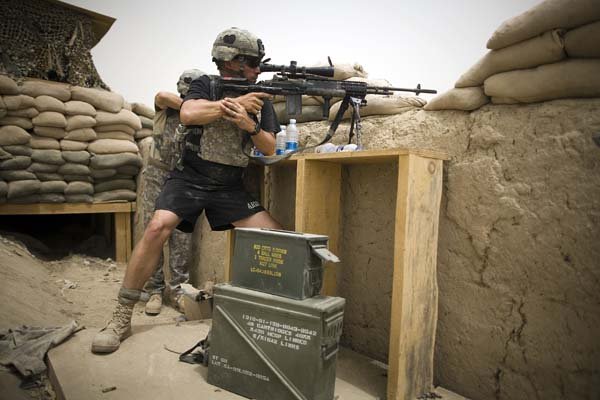KABUL, Afghanistan — Two U.S. servicemen were killed Thursday in a helicopter crash in Helmand province, the third fatal copter crash in the south of Afghanistan in less than two months.
Taliban forces claimed to have shot down the aircraft. The NATO force said an investigation was under way and hostile fire could not be ruled out.
American military deaths in Afghanistan are running at their highest levels of the nine-year war. Sixty U.S. servicemen were killed last month - a new high - and the latest fatalities bring July’s tally to at least 50.
Two NATO helicopters were lost during June. One of those was shot down, and one crashed because of mechanical problems. Both crashes also took place in the Taliban heartland, where the majority of Western military casualties occur.
Interactive
A coalition military offensive centered on Kandahar, the south’s main city, is gathering momentum after months of delays, with fighting heating up in outlying districts where Taliban fighters have long been in control.
The NATO force is heavily dependent on helicopters for troop transport, resupply runs and combat missions, because many of the roads in Afghanistan are poorly maintained and the rough terrain makes ground travel difficult.
But helicopters are vulnerable to malfunction in the harsh climate, and NATO says the Taliban supreme commander, Mullah Mohammed Omar, has ordered field commanders to try to procure more heavy weapons, some of which could be used to target aircraft.
Thursday’s crash took place near Lashkar Gah, Helmand’s provincial capital. Thousands of U.S. Marines and British troops are deployed in the area, which is close to the town of Marjah, the scene of a major offensive earlier this year.
Afghan and Western officials, meanwhile, reported the arrest of an insurgent leader who they said had plotted to attack an international conference earlier this week. The man was captured Wednesday night near the capital, Kabul, in a raid by NATO and Afghan forces, the military announced Thursday.
Authorities had already reported the separate arrests or killings of several Taliban operatives intending to try to strike at the conference. Tuesday’s gathering drew dozens of high-level diplomats, including U.S. Secretary of State Hillary Rodham Clinton and U.N. Secretary-General Ban Ki-moon.
The U.N. chief ’s plane was diverted to a nearby air base because of rocket fire aimed at the international airport, but insurgents did not manage to otherwise disrupt the meeting. The Taliban, though, called the gathering a “futile” exercise that proved that the Western military effort was “doomed to failure.”
Meanwhile, the Obama administration targeted key Taliban leaders with new financial sanctions Thursday.
The action by the Treasury Department will freeze the militants’ assets, ban travel and trigger an arms embargo. It follows similar action by the United Nations earlier this week and comes after calls from Gen. David Petraeus, the top military commander in Afghanistan, and Sen. Carl Levin, D-Mich.,chairman of the Senate Armed Services Committee, for sanctions against Afghan insurgent commanders operating in Pakistan.
Taken together, the U.S. and U.N. sanctions prohibit any financial transactions of the terror leaders in U.N. member countries, putting additional pressure on Pakistan to take broader actions against the Taliban militants.
U.S. officials have been urging Pakistan to crack down on the al-Qaida-linked Haqqani network, saying Islamabad’s reluctance to move into group’s base in North Waziristan is hampering the Afghan war effort.
Pakistan has been moving cautiously and has been slow at times to take on militantsthat Islamabad does not believe pose a direct threat. Pakistan has had historic relations with some of the Afghan insurgents, and analysts suggest that Islamabad perceives them as useful allies in Afghanistan when international forces withdraw.
The Afghan government, meanwhile, has been pushing to try and talk with some insurgent factions, hoping to turn them away from violence. U.S. officials warn, however, that reconciliation is unlikely to succeed until the militants’ momentum on the battlefield is reversed.
Information for this article was contributed by Laura King of the Los Angeles Times and by Lolita C. Baldor and Robert Burns of The Associated Press.
Front Section, Pages 2 on 07/23/2010
